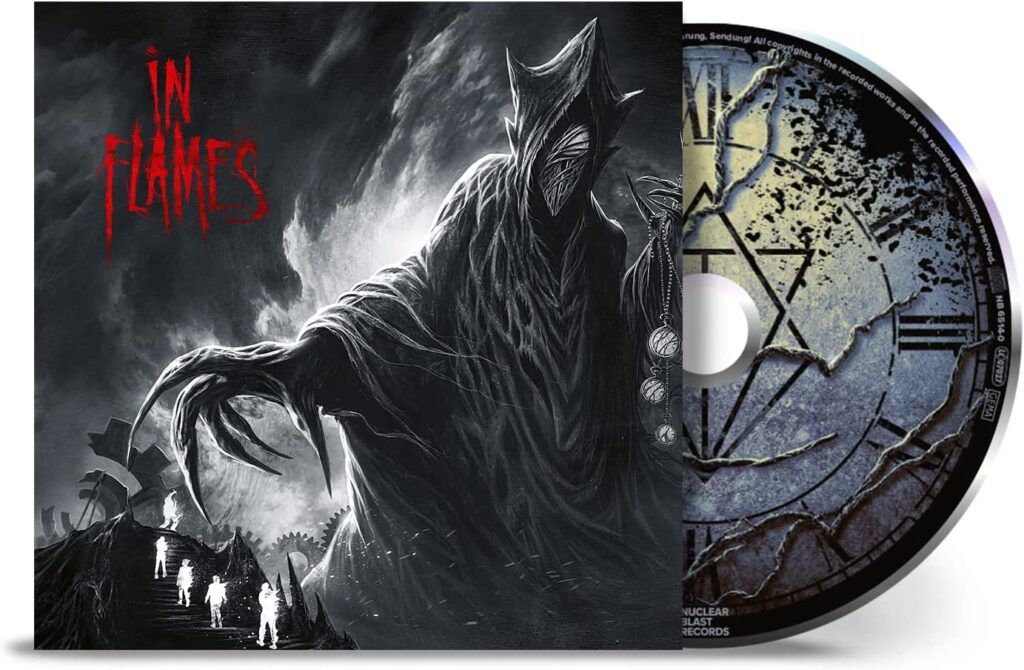
As with any long-standing band that has a) dared to evolve and b) had the temerity to taste success, In Flames tend to attract at least as much opprobrium from older fans as they do praise from newcomers. To an extent, it’s easy to understand. From the ferocious melodeath of the band’s early work, through the increasingly melodic alt-metal of the band’s recent output, a pivot towards accessibility is always the hardest pill to swallow, and many fans watched in dismay as the melodic elements began to significantly outweigh the metallic. Which is not to dismiss In Flames’ recent work, much of it has been excellent, but it certainly has proven divisive. With Foregone, however, the band have gone some way to redressing the balance, with a harder edge to much of the material and a grittier production than we’ve seen for some time.
Opening with the short scene setter, The Beginning Of All Things That Will End, In Flames do much to disguise the fact that Foregone is their heaviest album since 2006’s Come Clarity. However, the satisfyingly raw State Of Slow Decay soon makes things clear. Still far more streamlined than the band’s early output, and not short of a melodic chorus, State Of Slow Decay nonetheless packs a heavy punch, setting a high bar for the album that follows. Next up, Meet Your Maker edges into more commercial territory, although there’s still plenty for fans of the band’s heavier material to admire, not least the harmonised leads that soar at its heart. The band remain in an accessible mode on Bleeding Out, a track built around a chunky riff that sees the band deftly shifting through the gears. Another track with some sparkling lead work, it may have a chorus custom built for stadiums, but it still carries serious weight. Everything so far, however, is prelude and the title track emerges as a two-part epic that stands as some of the best work the band have done. Part I is a rampant, melodeath treat, complete with a ferocious vocal performance and some storming riffs, all of which serves to place the band’s metal credentials firmly to the fore. Pt II, meanwhile, is a lighter, if schizophrenic, piece, that sees the band slipping between emotive verses and a savage chorus that is all the more impactful as result. Rounding out the album’s first half, the subtle intro to Pure Light Of Mind harks back to the opening track, before revealing a mid-tempo piece that cleaves close to the goth-infused alt-metal of Battles.
Opening the album’s second half, the band quicken the pace with The Great Deceiver, a track that neatly summarises the In Flames sound, with its deftly interwoven guitar lines and crushing riffs. One of the album’s heavier tracks, it re-establishes the link to Come Clarity and will surely slay in the live environment. Equally powerful is In The Dark, a surprisingly claustrophobic piece, that showcases the band’s meaner side, although a sweet Maiden-esque interlude keeps things from becoming too bleak. Next up, the scything riff of A Dialogue In B Flat Minor offers plenty of opportunities for melody and might in equal measure, and it offers some truly ominous riffs as it progresses. The swinging riff that opens Cynosure has a satisfyingly neck-snapping grove, although the track takes an interesting left-turn, deploying a Tool-esque bassline that recalls Wallflower– Battles’ finest moment. The album proper concludes with the gritty, dynamic End The Transmission. With a surprisingly brutal vocal on the verse, neatly juxtaposed with one of the album’s most brilliantly addictive choruses, End The Transmission is possibly the best example of In Flames 2023, straddling the heavy and the harmonious with aplomb. For those who buy the special edition, there’s also a bonus track in the form of Become One, a ferocious encore that is more than worth the additional cost, although it more or less repeats the structure of End The Transmission, which explains why it was left over as a bonus, rather than incorporated into the album proper.
At this point in their career, it is inevitable the In Flames will have detractors and the emphasis on melody will ensure that many vocal critics remain. However, for those who have enjoyed the band’s evolution, yet enjoy the heavier side of the band’s output, Foregone is an immensely enjoyable ride. In terms of musicianship, the band remain technically capable, although Bjorn arguably gets to showcase more of his lead skills on this album; but it is Anders who seems to have emerged as a charged presence here, his vocals more ferocious than in some years now. Of course, for all the metallic might the band deploy, there are still plenty of memorable melodies, and the result is an album that recalls the brutal beauty of Come Clarity, albeit utilising the more streamlined production found on the likes of Siren Charms and Battles. As such, Foregone serves as a sort of best of the band’s post-Clayman output, effectively bridging the melodeath and alt-metal worlds the band commonly inhabit. 8.5/10



